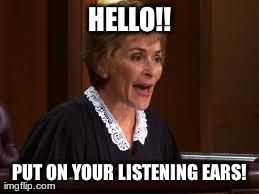This season (fall 2015 through spring 2016)
is Judge Judith Scheindlin’s 20th as “Judge Judy.”
She’s 72 years old and still pulling 10 million viewers every day.
The Guinness Book of World Records names her the longest running TV judge. She’s handled over 10,000 cases over about 5,000 shows in her career so far.
I admire this lady. She’s no-nonsense, and she doesn’t let anyone get away with playing the victim.
Most of us have seen at least a few of her shows, and heard some of her more famous sayings that she often shouts from the bench. It occurred to me the other day that we writers (and other creatives) could learn a lot from her.
Usually I’m all about learning to be your best cheerleader. Creatives are usually too hard on themselves, and need to be encouraged to give themselves a break.
But sometimes, we need the opposite—a little tough love. For that, Judge Judy is perfect.
Here are seven of Mrs. Schiendlin’s sayings that we can use to wake up our writing careers.
via GIPHY
1. I Don’t Care
I’ve listed this one first because I think it may be the hardest one to swallow. But it’s the truth, and the sooner we can accept that, the better we’ll manage the ups and downs of the writer’s life.
Of course there are exceptions. There are writers, editors, agents, and more that do care about young artists, and do everything they can to help. But we can’t count on these people. We have to realize that the majority of the those we submit to, pitch, or ask to read our stuff simply don’t care.
At first.
It’s no negative reflection on them. Everyone has their own lives to worry about. Everyone is busy, hurried, stressed, and dealing with their own problems.
That means that it’s up to us to make them care. We have to suck them in with our hooks, synopses, voice, and persistent (but polite) efforts.
It can be discouraging. We think people should care. We put so much work into our projects. People should pay attention. But if we ask ourselves how much we pay attention to other stories, books, blogs, etc., we can soon realize the reality of the situation.
That can help us take the rejections and the flat out lack of interest less personally.
People don’t care…unless somehow, you can get them to.
2. Try Again.
Judge Judy usually uses this one when a plaintiff or defendant is trying to give her the run-around. But for writers and other creatives, we can take it as a mantra…for life.
Rejected? Try again. Stuck on a story? Try again. Book didn’t do so well? Try again.
This writing thing isn’t easy. Those who succeed are persistent, above all other traits. We learn by trying and failing and trying again. It’s the way it works.
So if you’re worried about failure number ten (or twenty or one-hundred), don’t be. Just try again. No drama. No “I’m just not good enough.” Nonsense. All writers go through failure all the time.
Try again. It’s the only way you’ll eventually succeed.
 3. Pay Attention
3. Pay Attention
Imagine Judge Judy banging her pencil on the desk and shouting, “pay attention!”
The writing industry is changing faster than ever before. Every year there’s something new going on. Creative folks often like to stay insulated in their own private worlds, but we have to poke our heads out now and again to stay up with this world we’re living in.
“Book publishing is changing all the time,” says Joel Friedlander over at The Book Designer, “and that change is happening faster than ever before. We all need to keep up….”
The good news is that authors have more choices today for how to pursue their careers. We need to educate ourselves, though, in order to learn what choices are best for us.
That means going to conferences, taking classes, and working with mentors on a regular basis. If we take a professional approach to our writing, no matter where we are on the career ladder, we’re more likely to stay on top of what we need to know.
Pay attention. Don’t let the new world pass you by.
4. Get Un-Nervous
Judge Judy has no sympathy for those who get nervous in her courtroom. “Get un-nervous,” she tells them, and expects them to comply.
Writers can benefit from the same advice. We so often let fear control us. We hesitate to send out submissions fearing rejection. We shy away from face-to-face pitching for fear we’ll lose our tongues. We quiver and quake in the presence of agents and editors.
It’s time to get un-nervous. As one of my favorite writing mentors once told me, no one’s going to arrest you for sending something in the mail—even a submission (gasp!) to a publisher who says they don’t accept unsolicited submissions.
I’ve referred to that advice often, especially when I find myself hesitating to do something that my inner voice has urged me to do. Submit to that publisher. Ask for that feedback. Step out of my comfort zone.
Am I going to be arrested?
If not, I usually go for it. I may still feel nervous, but I do my best not to act like it.
Get un-nervous, or at least, don’t let them see you sweat.
 5. You have two ears and one mouth for a reason.
5. You have two ears and one mouth for a reason.
I love when Judge Judy says this, as it reminds me of my father.
A tough Marine, he repeated this phrase numerous times when my brothers and me were growing up. Listening teaches you more than talking, he was saying.
Unfortunately, as writers, we can forget this. Particularly when we get caught up in marketing our stuff, we can become so consumed with talking and persuading and convincing that we forget to listen.
It’s a proven fact that people become interested in you after you show interest in them. Think about how you feel when someone else shows interest in you. Suddenly they are more interesting in return, right?
And the best way to show interest is to listen. Hear what people are saying, and respond accordingly. Save your marketing for later. In addition to helping you establish relationships, it will also help you learn more.
I mean, it’s amazing what you can pick up in a conversation. Ideas for new characters. Insights into other professions and lifestyles. Stories of heartbreak and triumph.
All great fodder for stories.
So remember—we all have two ears for a reason.
“In a world full of noise,” says bestselling author Jeff Goins, “the way you get people to care about you is to care about them first.”
Then apply what you learn to what you deliver.
 6. Don’t get too comfortable.
6. Don’t get too comfortable.
Judge Judy tells a plaintiff this when she’s about ready to dismiss his case, or when one of the parties starts to assume he’s well on his way to winning thousands of dollars…and he’s wrong.
Humans are extremely adaptable. Once we spend a certain amount of time in a situation, we tend to get used to it. It becomes routine. We settle in. We get comfortable.
This can be a bad thing for writers.
Once we get comfortable, we tend to slack off. Maybe we don’t write as many words a day. We don’t push ourselves to submit as often. We figure nothing’s going to change anyway, so we just go along in our set routines.
If you find yourself getting too comfortable, it often means one thing—you’ve stopped growing. It’s time to shake things up. Try something new. Push yourself a little more.
“We like to ensure that Kent writing students don’t get too comfortable sitting at their desks,” say the instructors at the University of Kent Center for Creative Writing. “Sometimes they need to take a pair of scissors to their text. Sometimes they get to finish each other’s sentences. Sometimes we make them walk around in the rain.”
You may not need to take it that far, but then again, if you’re relaxing a bit too much on the couch with the novel you’ve been working on for three years, a little bad weather may be just what you need.
7. Stand on your own two feet.
Judge Judy goes after slouchers with a vengeance.
Stand up! Speak up!
This is good advice for anyone, but particularly for writers who are meeting readers, agents, editors, or others in the industry face-to-face. Studies have proven that our body language can lead our emotions. A 2009 study, for instance, showed that participants who sat up straight had more confident thoughts.
“Most of us were taught that sitting up straight gives a good impression to other people,” said professor Richard Petty, co-author of the study. “But it turns out that our posture can also affect how we think about ourselves. If you sit up straight, you end up convincing yourself by the posture you’re in.”
A 2010 study found that those that assumed more open, confident body postures actually felt more powerful, and were more open to taking risks.
Bad posture, on the other hand, was found to feel more negative emotions and sadness.
So next time you’re headed into a meeting or networking event that makes you nervous, think about your posture. Stand up straight. Throw your shoulders back. Smile. You’ll feel better instantly.
If that doesn’t work, just be grateful that you’re not having to face Judge Judy. Certainly any editor or agent is a little easier to approach?
Do you know of other Judge Judy sayings that could be applied to the writing life? Please share them with our readers.
Sources
“Study: Body Posture Affects Confidence in Your Own Thoughts,” Ohio State University, 2009, https://researchnews.osu.edu/archive/posture.htm.
Adam D. Galinsky, “How You Can Become More Powerful by Literally Standing Tall,” Scientific American, January 4, 2011, http://www.scientificamerican.com/article/how-you-can-become-more-p/.
Nair, Shwetha, et al., “Do slumped and upright postures affect stress responses? A randomized trial,” Health Psychology, June 2015; 34(6):632-641, http://psycnet.apa.org/psycinfo/2014-37739-001/.


I just love this, Colleen! I especially love # 4–Get Un-nervous. It reminds me of your guest blog where you talked about finally getting angry in response to nerves, and competing much more strongly! I’ve kept that in my awareness, as it’s SUCH a great tool!
Thanks, Susan! Yeah, it’s hilarious when she says that. “Well then get un-nervous!” Seems harsh, but after years of performing, I’ve learned that there’s not much else that works except stiffening your backbone a bit!
What a great article! Thanks, Colleen!
Thanks, Katy!
Judge Judy’s right when she says “They don’t keep me here because I’m gorgeous; they keep me here because I’m smart.”
Ha ha. I love that quote too, Diana. :O)
This is great!
Thanks, Linda!